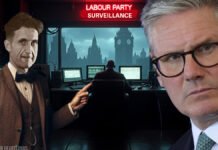This time it’s not the Tories.
As much as £1bn in benefit fraud has been prevented from being paid to organised-crime groups in recent months
But before the scam was spotted, officials unwittingly confirmed thousands of stolen identities.
Fraudsters took advantage of looser rules introduced to cope with a surge of universal credit claims during the pandemic.
BBC News has asked the Department for Work and Pensions for a response.
Wrong hands
In May, a junior civil servant working with High Street banks noticed dozens of claims for universal credit had been made asking for money to be paid into the same bank account.
Further investigation identified more than 100,000 fraudulent claims.
And officials admit they had confirmed thousands of people’s identities to the gangs that had stolen them – and passed on their National Insurance numbers.
The Department for Work and Pensions wants to write to those whose data has been compromised.
But BBC News has learned it is struggling to identify many of them and is wary of sending out letters to last known addresses in case they end up in the wrong hands, exacerbating the data breach.
Identity checks
Claimants whose identities have been stolen can face real hardship, as it can be months before their accurate benefits are paid.
Currently, 5.7 million people receive universal credit, almost double the figure for March.
To cope with the surge, identity checks were processed online, rather than face-to-face, and information such as the cost of rent and whether someone had been self-employed taken on trust.
Criminal gangs have attacked several government Covid-19 schemes.
DWP officials have asked the Treasury for £200m over three years, in this spending round, calculating it would enable it to prevent such mass scams and save taxpayers about £500m each year.
It is estimated more than a million claims for universal credit have still to be properly checked, with additional rising concerns tens of thousands of people may have claimed the benefit without declaring they had received government grants to help the self-employed.
However, the Treasury has turned down the request.
BBC News Report By Michael Buchanan
Social affairs correspondent, BBC News
Support Independent Journalism Today
Our unwavering dedication is to provide you with unbiased news, diverse perspectives, and insightful opinions. We're on a mission to ensure that those in positions of power are held accountable for their actions, but we can't do it alone. Labour Heartlands is primarily funded by me, Paul Knaggs, and by the generous contributions of readers like you. Your donations keep us going and help us uphold the principles of independent journalism. Join us in our quest for truth, transparency, and accountability – donate today and be a part of our mission!
Like everyone else, we're facing challenges, and we need your help to stay online and continue providing crucial journalism. Every contribution, no matter how small, goes a long way in helping us thrive. By becoming one of our donors, you become a vital part of our mission to uncover the truth and uphold the values of democracy.
While we maintain our independence from political affiliations, we stand united against corruption, injustice, and the erosion of free speech, truth, and democracy. We believe in the power of accurate information in a democracy, and we consider facts non-negotiable.
Your support, no matter the amount, can make a significant impact. Together, we can make a difference and continue our journey toward a more informed and just society.
Thank you for supporting Labour Heartlands












